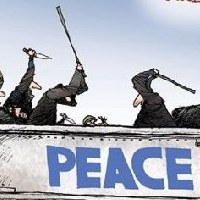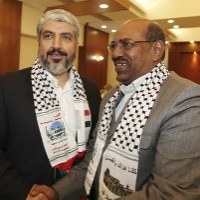![]()
Thu, Aug 4, 2011 | The Meir Amit Intelligence and Terrorism Information Center

Screen between programs on Hamas' Al-Aqsa TV: The key (symbol of the "right of return") as the barrel of a cocked rifle (the symbol of the "armed resistance").
Hamas reject the Palestinian Authority’s proposed September UN move
Senior Hamas figures reiterate extremist positions, reject the Palestinian Authority’s proposed September UN move and emphasize the ideological and strategic differences between Hamas and the PA. Their statements, reflecting the impasse of the Hamas-Fatah reconciliation, are probably meant to prevent Mahmoud Abbas from making concessions to the United States and Israel.
Overview
Senior Hamas figures again recently emphasized the movement’s fundamental intransigent positions, especially the refusal (despite international pressure) to recognize Israel and to “give up” even one inch of the land of Palestine, and the support for terrorism (the so-called “resistance”) and adherence to the so-called “right of return” of all the Palestinian refugees to the territory of Palestine. Mahmoud al-Zahar and Khalil al-Hayeh, both from the Gaza Strip, adamantly rejected the move Mahmoud Abbas is expected to make in the UN in September (calling it “empty words,” “a political trick” and “an illusion”) and the world view it is founded on (“the two-state solution”).
Their remarks and the effort to emphasize the essential differences between Hamas and the Palestinian Authority regarding the conflict with Israel contradict the reconciliatory tone in the statements made by senior Hamas figures following the internal Palestinian reconciliation agreement of May 2011. in our assessment, Hamas’ statements intends to hobble Mahmoud Abbas before the move in the United Nations, and at the same time reflect the impasse of the internal Palestinian dialogue. Hamas’ tactics may help the Palestinian Authority represent itself as pragmatic and different from Hamas, but also have a negative effect on Mahmoud Abbas’ pretensions to appear in the United Nations as representing all Palestinians.
Hamas Statements
Senior Hamas figures recently used various opportunities and forums to restate the movement’s rigid, extremist fundamental position regarding the conflict with Israel. For example, Ismail Haniya, head of the de-facto Hamas administration in the Gaza Strip, welcoming a delegation from Malaysia, emphasized Hamas’ adherence to its principles, especially its refusal to cede one inch of the territory of “Palestine” and its insistence on the “right of return” of six million Palestinian refugees outside Palestine (Safa News Agency, July 31, 2011). Usama Hamdan, responsible for Hamas’ international relations, gave a speech in support of the “option of resistance” (i.e., terrorism) at the recent conference in Cairo, in which he said that “[t]he conflict will never come to an end until Israel comes to an end,” adding that “Regarding what some have demanded of us, to recognize the enemy, that matter is behind us. We then clearly said that we will never recognize Israel, and today I say more than that: Israel completely doesn’t exist in our political or intellectual dictionary” (Hamas’ Al-Aqsa TV, July 24, 2011). Hamdan made statements in the same spirit in an interview with the website of Egypt’s El-Amal Party. He said that the “liberation of Palestine” would be achieved only through “resistance” (i.e., terrorism), stressing that the so-called “resistance” would continue “until the liberation of the lands of Palestine from the [Mediterranean] sea to the [Jordan] river” (El-Amal website, July 25, 2011)
Two other senior Hamas figures in the Gaza Strip recently opposed the proposed Palestinian Authority move in the UN:
1) Mahmoud al-Zahar told an interviewer from the German News Agency that Mahmoud Abbas’ planned move in the UN was empty talk and a “political trick.” He completely rejected the concept of the two-state solution, the foundation for Mahmoud Abbas’ appeal to the UN, saying that “[w]e do not recognize Israel, and it is very simple. We do not recognize Israel as controlling, not even one centimeter [of the land of “Palestine”], because it is an artificial state.” He also warned that recognizing the right of the State of Israel to exist would harm the so-called “rights” of millions of Palestinian refugees to “Palestine,” asking “[w]ho will go to the refugee camps and tell the people that they do not have the right to Palestine?” (Qudsnews website, July 30, 2011, quoting an interview with the German News Agency).
2) On July 31, Khalil al-Hayeh, a member of Hamas’ political bureau, said at a reception for a Malaysian delegation visiting the Gaza Strip that the appeal to the UN was only an illusion and would not lead to anything that would serve the Palestinian cause. He said that “the Palestinian people are still bowed under the occupation, and there is nothing to be done but to end it by means of the resistance [i.e., terrorism and violence].” He said that the Palestinian Authority did not have a “political horizon” and that the PLO’s deliberations with Israel (“the country of the occupation”) had reached a dead end (Website of Hamas’ daily Felesteen, July 31, 2011).
Hamas’ daily Gaza Strip paper Felesteen printed an Op-Ed column entitled “The position of the resistance factions on the target date in September,” written by Hussam al-Dajani. It expressed fear lest the expected move at the UN have a negative impact on the “right of return” of the Palestinian refugees and on the future of the “resistance” and the “weapons of the resistance” [i.e., anti-Israeli terrorism]. The negative impact might be the result of pressure exerted on Mahmoud Abbas to agree to a Jewish state, and he might agree that the return of Palestinian refugees be limited to the future Palestinian state [and not to the territory of Israel]. In addition, the United Nations was founded on the principle of ensuring world peace and security, and that would give Israel the legitimate right to attack Hamas and the Palestinian Islamic Jihad. According to the column, it would mean that “we might be subject to international sanctions or an international military strike against the resistance factions, greatly endangering the future of the resistance and of the weapons of the resistance, and mean the genuine destruction of the Palestinian cause.”
Significance
The public statements made by the senior Hamas figures underline the essential differences between Hamas’ worldview and the Palestinian Authority regarding the conflict with Israel, just as the PA is preparing to enter the UN arena this fall. In our assessment they reflect Hamas’ fear of the erosion of its basic positions in the conflict with Israel. Their primary objective, in our assessment, is to force Mahmoud Abbas to adhere to Hamas positions, to prevent Mahmoud Abbas from what Hamas regards as capitulating to the United States and Israel on a basic issue, and to prevent the Palestinian Authority from making political capital.
Hamas’ current behavior contradicts the conciliatory tone used by senior figures (especially Khaled Mashaal) following the internal Palestinian reconciliation agreement (May 4, 2011).[1] They made it clear they were prepared to give the move in the UN a chance (although they made it clear they did not have high expectations) on condition that it would not be accompanied by ideological recognition of the State of Israel or a waiving of the Palestinian refugees’ so-called “right of return.”[2]
For example, after the Palestinian reconciliation agreement was signed, Khaled Mashaal was asked whether Hamas would give a new arrangement (i.e., the move planned by the Palestinian Authority) a chance. He answered that the 20 years since the Madrid Conference had proved that “Israel does not deserve another chance to prove itself…” As far as Hamas was concerned, the movement did not need “to try again,” but if there were Palestinians or Arab countries which wanted to give Israel another chance, Hamas was prepared to let that happen, for a short period of time, for the sake of the Palestinian cause and to save the Palestinian reconciliation (Khaled Mashaal interviewed by Hamas’ Al-Aqsa TV, May 9, 2011).
In our assessment, Hamas’ emphasis of its rigid fundamental positions in the Arab-Israeli conflict and its objections to to the Palestinian move in the United Nations for ideological reasons (the refusal to recognize the State of Israel, adherence to the so-called “right of return”) are an expression of the impasse at which the internal Palestinian dialogue has found itself since the May 4 signing of the reconciliation agreement.[3] Emphasizing the essential differences between the Palestinian Authority and Hamas may, on the one hand, help the PA represent itself in its planned political moves as pragmatic, different from Hamas and prepared to deal with the difficult requirements of the internal Palestinian arena as a way of promoting its political position in the conflict. On the other hand, however, emphasizing the rift between them brings into prominence the internal Palestinian ideological and strategic schisms, erodes the image of internal Palestinian unity theoretically achieved with the Hamas-Fatah reconciliation, and may harm Mahmoud Abbas’ pretensions of representing all the Palestinian when he appeals to the United Nations.
Notes:
[1] The conciliatory tone was accompanied by a smile spin for the West.
[2] For further information see the May 16, 2011 article “Radical Islamist Hamas Movement Struggles to Present a Moderate Image Since the Palestinian Reconciliation Agreement” (ITIC).
[3] Another example is Mahmoud al-Zahar’s smear of Salam Fayyad. Interviewed by the German News Agency, al-Zahar said that pro-Western Salam Fayyad, who has achieved international recognition, was “an agent, not a patriot,” and that “we do not want him” (Qudsnews website, July 30, 2011).



 RSS
RSS










#Hamas reject the Palestinian Authority’s proposed September #UN move | #Israel http://bit.ly/oI9pHM
Hamas reject the Palestinian Authority's proposed September UN … http://bit.ly/qO9SML
#Hamas reject the Palestinian Authority’s proposed September #UN move | #Israel http://bit.ly/oI9pHM
#Hamas reject the Palestinian Authority’s proposed September #UN move | #Israel http://bit.ly/oI9pHM